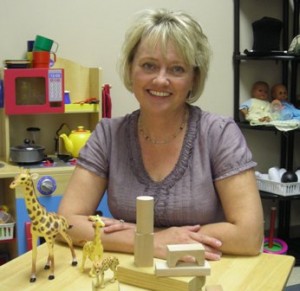 "I provide practical solutions to child behavior problems," says Pam Dyson, LPC, RPT of St. Louis. What parent couldn't use some practical solutions?
"I provide practical solutions to child behavior problems," says Pam Dyson, LPC, RPT of St. Louis. What parent couldn't use some practical solutions?
As a child development expert, parenting coach, licensed professional counselor and registered play therapist, Dyson is clear about her mission to help children and families through play therapy and parent coaching. Learn more about Dyson's private practice journey, how she manages the ebb and flow of income impacted by the school year sessions, and how play plays a role in her own self-care.
Why did you decide to open a private practice?
I entered graduate school in mid-life with the goal of opening a private practice. Having been an early childhood educator for many years I knew there was a need in my geographic area for a therapist specializing in working with children 3-10 years of age.
I knew how to reach my target audience and I knew there was a market for additional specialized services such as consulting and coaching. I also wanted the freedom to set my own hours. I knew that only by having my own practice would I be able to achieve all of those goals.
Clients that therapists find to be the most "difficult" are sometimes the ones who can teach them the most. What have you learned from your toughest clients?
Young children with challenging behavior problems try the patience of parents and caregivers and can be challenging for therapists. The younger the child, the less they have the ability to express their feelings and their needs. Play therapy gives a child the freedom to express their feelings through toys and play materials.
By being with a child and observing their play I gain an understanding of what the child needs. Once a child is heard and understood we can begin implementing strategies to meet the child’s needs and overcome challenging behaviors. Understanding the child from the child’s perspective is the key to the process.
What's your biggest pet peeve about private practice?
The unpredictability of steady income. There are cycles when I’m busy and when I’m not. Mine is related to the school year. When school is not in session during the summer and holiday breaks children are not being brought to therapy. My busiest times of year are in the fall after school starts and after the winter break. I supplement my income with consulting services to schools and other professionals, parent coaching and play therapy training to mental health professionals.
How did you discover or develop your practice "niche"?
I was an early childhood educator before I became a therapist. When I enrolled in graduate school I knew I wanted to work with children using play therapy. I took course work related to counseling children, completed an internship at an agency specializing in child therapy and attended seminars and workshop specific to play therapy. Once I was licensed and opened my practice I already had a solid skill base as a play therapist. Having been a teacher I also had the skills necessary to work collaboratively with parents. It was a natural fit.
What resource (book, website, person) helped you the most when setting up your private practice?
I stumbled across an article by Lynn Grodski in Psychotherapy Networker Magazine that inspired me to pursue private practice. I felt she addressed my questions realistically so I read more of her writings and subscribed to her email newsletter.
What has surprised you most about being in private practice?
How much I enjoy every aspect from seeing clients to paying the bills. I anticipated not enjoying the routine, mundane tasks but I take pride in overseeing every detail.
Has your private practice helped you grow professionally? How so?
I’ve gained a lot of experience as a play therapist and two years ago I put those skills into training other therapists in the modality of play therapy by founding the St. Louis Center for Play Therapy Training. www.stlplaytherapy.com As an approved provider of continuing education for the Association of Play Therapy www.a4pt.org I offer training opportunities for mental health professionals who are pursing credentialing as a registered play therapist. As word of the quality of my trainings has spread I’m receiving requests to bring play therapy training to locations across the country.
Has it helped you grow personally, too? How so?
I’ve gained a lot of self-confidence not only in my ability to provide quality therapeutic services but in my ability to manage the business side of my practice. Presenting at conferences and seminars has helped me develop public speaking skills.
Being a therapist can be emotionally exhausting. What do you do to care for your own emotional and psychological health?
When I lock client files in the file cabinet at the end of the day I symbolically lock away my emotional connection to them as well. It ensures I don’t take my work home with me. I make it a priority to do things that are fun and playful such as listening to music, going to concerts and making handcrafted items. It would be challenging to be an effective play therapist if I didn’t make time to play.
How do you cope with the inevitable stressors involved with being your own boss?
I handle all of the day to day details of my practice myself. I’m a very organized person and I rely on to-do lists. While it’s time consuming it’s not overwhelming. I network with other private practice therapists for support and encouragement regarding the challenges of private practice.
What personal strengths have helped you succeed in private practice?
Growing up on a farm in Kansas helped me develop a strong work ethic. I’m not afraid to push up my sleeves and tackle whatever needs to be done in order to be successful. My social skills are strong so networking and marketing come easy to me. I also have a lot of self awareness and recognize that growing and maintaining a private practice is a process that takes a lot of patience and perseverance and that I sometimes need to reach out to my peers for support and encouragement.
To learn more about Pam Dyson's private practice visit PamDyson.com
If you'd like to be featured in "Adventures In Private Practice Column" please submit a practice summary, and answers to the above questions here.
 In past posts I've explored the the positives and negatives of joining a group private practice. Now, it's time to focus on the pros and cons of running a solo private mental health practice. When I opened Wasatch Family Therapy nearly 10 years ago, it started out as a solo practice that slowly built over time into a group practice. While I like being "in charge" and autonomous, I'm also an extravert and I highly value my connections with others.
In past posts I've explored the the positives and negatives of joining a group private practice. Now, it's time to focus on the pros and cons of running a solo private mental health practice. When I opened Wasatch Family Therapy nearly 10 years ago, it started out as a solo practice that slowly built over time into a group practice. While I like being "in charge" and autonomous, I'm also an extravert and I highly value my connections with others.

 "I provide practical solutions to child behavior problems," says
"I provide practical solutions to child behavior problems," says 
 Relying solely on direct clinical hours may leave private practitioners financially vulnerable to income instability. Since client hours in private practice can vary greatly depending on the time of year, state of the economy, number of new referrals, and several other factors, developing multiple income streams can help you to create a more stable income. "By having the other income streams in place, I have been able to be less susceptible to the ebbs and flows that occur in private practice during difficult economic times," says
Relying solely on direct clinical hours may leave private practitioners financially vulnerable to income instability. Since client hours in private practice can vary greatly depending on the time of year, state of the economy, number of new referrals, and several other factors, developing multiple income streams can help you to create a more stable income. "By having the other income streams in place, I have been able to be less susceptible to the ebbs and flows that occur in private practice during difficult economic times," says
As healers, we genuinely like to do our work. Guiding clients through the therapy process and seeing them make progress is why we do what we do. But if you're in private practice, you know there's a lot going on in the back end and that it's crucial to run an efficient and organized business.